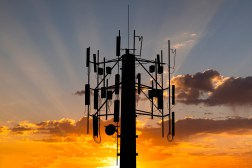DOD awards largest group of 5G testbed contracts to date

The Department of Defense awarded $600 million in 5G wireless experiment contracts as a part of the U.S.’s strategy to catch up in the development of the next-generation telecommunications technology, it announced Thursday.
The DOD has awarded smaller, pilot contracts for 5G testing before, but this round of contracts represents the largest scale of testing done to date. The bases that will feature the testbeds are Joint Base Lewis-McChord, Washington; Naval Base San Diego, California; Marine Corps Logistics Base, Georgia; Nellis Air Force Base, Nevada; and Hill Air Force Base, Utah.
The larger goal for DOD has been to help industry develop the technology by offering its bases as “testbeds,” according to its 5G strategy. Some locations, like Nellis Air Force Base, will see the development of new means to distribute command and control communications to avoid military networks being a single target for enemy fires. Other installations will focus on next-generation logistics management.
“The Department of Defense is at the forefront of cutting edge 5G testing and experimentation, which will strengthen our Nation’s warfighting capabilities as well as U.S. economic competitiveness in this critical field,” Michael Kratsios, acting undersecretary for research and engineering, said in a statement. “Through these test sites, the Department is leveraging its unique authorities to pursue bold innovation at a scale and scope unmatched anywhere else in the world.”
The companies receiving awards in this latest round of testing include AT&T, Ericsson, Nokia, KPMG, GE Research, Deloitte, Booz Allen Hamilton, General Dynamics Mission Systems and many others.
“We have now gotten to the point where the industry players are selected and have been moving forward now with finally being able to start deploying at the bases,” Joseph Evans, lead for 5G development at DOD, told reporters Thursday. “It has been a lot of activity to get here, but we are pleased we have been able to move this quickly.”
By allowing companies to use military bases to test the technology use cases, the companies are able to circumvent complex regulations. It also gives the military an opportunity to access greater connectivity at bases that have often lagged in their digital modernization.
The U.S. is highly concerned about the rapid development of 5G networks and involvement in espionage by Chinese telecommunications provider Huawei, even barring the company from government contracts.






